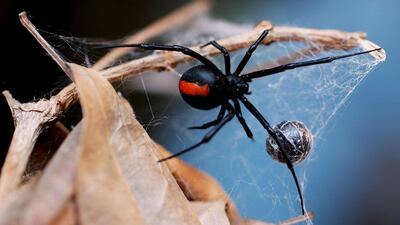DUBAI // Reports of poisonous redback spiders are increasing among people living in new developments around the city.
Residents in communities such as Emirates Hills and Al Furjan in Dubai, and Al Ghadeer in Abu Dhabi, have encountered the small spider in their gardens during the hotter weather.
No one has been bitten, although many were shocked that the potentially deadly spiders are in the UAE and so close to their homes.
Redbacks are not indigenous to the UAE and are thought to have been brought over in packing containers from Australia.
They have since spread throughout the country.
No one has died from a bite here, and antivenoms are available at most major hospitals.
Nicole Chahal, 28 from the UK, was about to take her 11-month-old son for a ride on a miniature car she keeps outside the front door of her Al Ghadeer villa, when she saw three female redback spiders in a cobweb in the spokes of a wheel.
“It was just lucky that I looked, otherwise the spiders could have been disturbed and bitten my son,” Ms Chahal said.
“I don’t know what I would have done if he had been bitten. It’s every parent’s fears come true.”
She said that the family hired National Pest Control to fumigate the house and garden two days later, but the experience had made her wary.
“Now any time we go out we check everywhere in case there are more spiders around,” Ms Chahal said.
“I knew there were redbacks here but I thought they were always under rocks, out of sight, and we weren’t in so much of danger of disturbing them without realising.”
Dinesh R, a technical manager of National Pest Control, said reports of the spiders reached a peak in 2006, with the company receiving at least one call a day.
These days they receive no more than one every two weeks.
“It does go in stages. Sometimes there are more, sometimes there are less,” Mr Dinesh said. “It’s certainly not anything to panic about. There are certainly a lot less than there were a few years ago.”
He said many sightings were reported about the time the Emirates Hills development was being built as the construction may have disturbed nests.
“These spiders are not native to the Middle East. The species has spread and is now prevalent.”
Cynthia Joubert, head of invertebrates at Sharjah Wildlife and Breeding Centre, said it was not unusual to find redbacks in new communities.
“They are around and people are moving in to where they would normally live,” Ms Joubert said.
“They may have always been there and construction has taken place where they were living.”
She said the centre was trying to breed UAE redbacks to better understand their behaviour.
“Very little is known about the species in the UAE,” Ms Joubert said.
“Obviously the more you know about them, the easier they are to manage.”
Desiree Goodchild, who lives in The Springs, said she saw a redback spider in her back garden and panicked.
“It shot out from the runners of the patio doors,” Ms Goodchild said. “I ran indoors, grabbed a can of bug spray and proceeded to empty half the can on to it.
“When I checked again in the morning, it was curled up in a ball dead. People just need to be really vigilant.”
Ms Joubert said people tended to overestimate the risk of being attacked by the spiders.
“The chances of getting bitten by one are quite minimal,” she said. “You need to harass them quite a lot in order for them to bite you.”
mcroucher@thenational.ae

